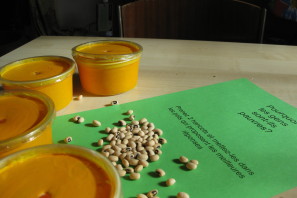Background
The activity Why are people poor? was trialled with multiple groups of Year 8 pupils (age 12-13) at our large Language Specialism secondary school. The school uses CLIL, a Content and Language Integrated Learning approach, which ensures that languages are taught through other curriculum subjects as well, making the language relevant and relational. CLIL encourages language learning to improve pupils interpersonal skills and cultural understanding.
This suburban Secondary school was doing a piece of work around Fair Trade and were interested to trial activities that would measure pupils understanding of Fair Trade and of wider issues around poverty and taking action. In keeping with their language learning ethos, the activities and the subsequent Fair Trade project were all delivered in French.
Once pupils had responded in French, we allowed them to respond in English as well, to ensure that any limited vocabulary wouldn’t prevent them from fully expressing their attitudes and ideas.
| Category | Comments | |
| Pas Intelligent
(not clever) |
22 | not clever in school – not good grades – not good job – no pay; inheritance – if your mum and dad are rich they’d send you to public school and then you get a well paid job, if not many people go to school they don’t know how to control a business, can’t read or write; not a good education so don’t get a good job – a good job means well paid – you can buy a nice house and nice things to go in it
|
| Pas Juste
(not fair) |
53 | not fair to live in a country with no political rights,
where they’re born – if it’s a poor country – it’s not their fault; if they’re ill and can’t work; if they have lots of children and it’s hard to pay for all the food, govt mess up; corrupt govts; no education – no chance – it’s not their fault, the rich have too much money – they should give some to the poor – I think so too, you can have people who are mega-rich, I think the rich should give to the poor; racism; Africa don’t get much money compared to Europe; if there’s not many jobs; jobs go to people with better backgrounds; racism they grow crops but don’t get enough money for them; sometimes the harvest is destroyed by locusts; no chance to start a business; poor working conditions; parents don’t let you go to school; gender and religion
|
| Inevitable
|
10 | it can change if the rich gave to the poor – tax – VAT
|
| Pas de chance
(unlucky) |
26 | no lottery! Natural disasters – tornadoes; smart but have no chance
people in Africa would die for an education; if you’re born into a slum; bad environment; lost your job or not enough jobs; got robbed
|
| Paresseux
(lazy) |
15 | not willing to go out and get a job,
Lazy in Europe, unlucky in Africa, they never get up and do things – they can’t be bothered – I watch Jeremy Kyle – they live on benefits; lazy at school, some families can’t be bothered to do things
|
| Pas un raison ici
(none of the reasons here) |
24 | Greed, too many people want everything for themselves; if their govt is corrupt like in Africa, Injustice everywhere in the world;
Stereotypes – like Essex: stupid, Berkshire: rich, Injustice in Africa, not enough job opportunities, Not educated enough but not because they don’t want to; it’s too hard to get a job – more in Africa than here, there’s no jobs – only farming – in Africa; If they spend money on alcohol and drugs; factory owners don’t pay enough; it depends what you use your money on – you might make good choices but just not have enough, Being mistreated – in Africa working conditions are not as good, they don’t have the same rights; don’t have a stable govt; They may have made a mistake – something happened – they may be addicted to drugs or alcohol and have lost everything People just want to rely on benefits |
| Je ne sais pas
(I don’t know |
5 |
It is clear that pupils have a strong understanding of injustice as a cause of poverty. They cite corruption, unfair political processes, access to education, racism and low prices for crop exports. They also listed many other reasons that weren’t included in the activity, showing a willingness to think beyond the simplistic answers provided for them. Whilst there is obviously some impact on pupils from media stereotypes about benefits claimants in the UK, the responses show compassion and empathy and a broad idea of poverty. It is interesting to note that almost all pupils have assumed that the activity is referring to poverty in Africa, despite the fact that this continent wasn’t mentioned at any time. This may be due to the fact that they knew they were embarking on a project about Fairtrade that would look at products from Africa, but it tells more of the general image of Africa as a place of poverty and little else.
Exploring Fairtrade is a great way to help pupils understand the inequalities in the world trade system as it currently stands, and also to encourage pupils to see connections between their own lives and the lives of others. Making campaign posters, raising awareness and auditing Fair Trade products in the school are all ways that young people can take action without having to spend money, or influence parents’ decisions on products that they buy.



